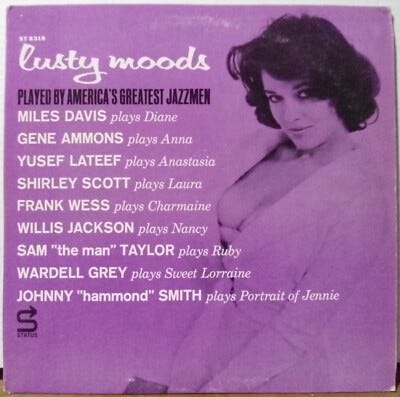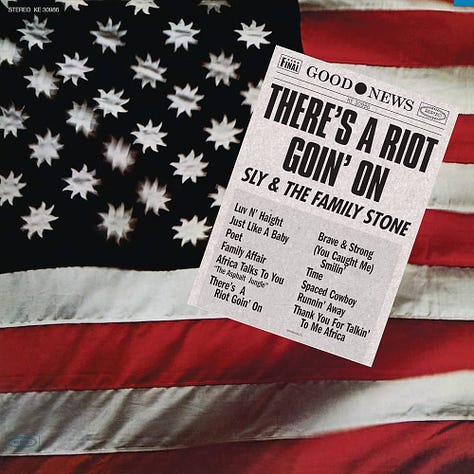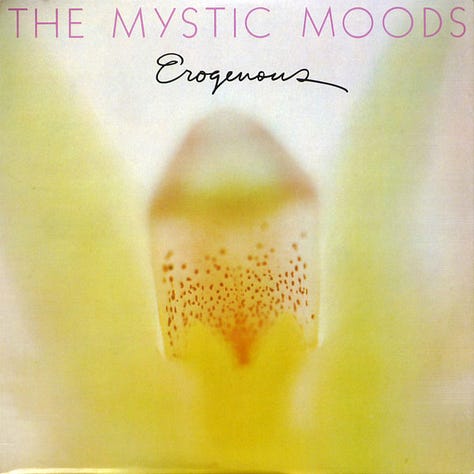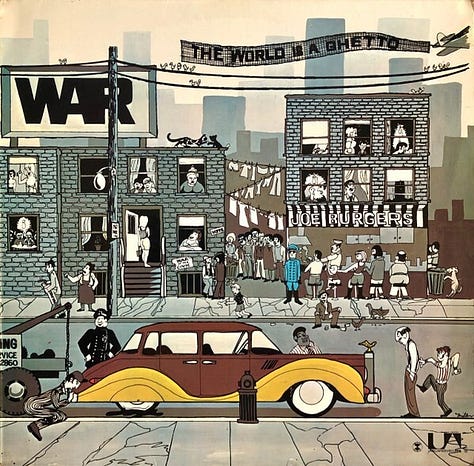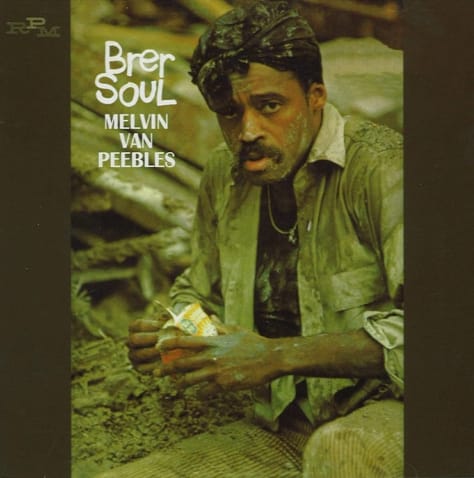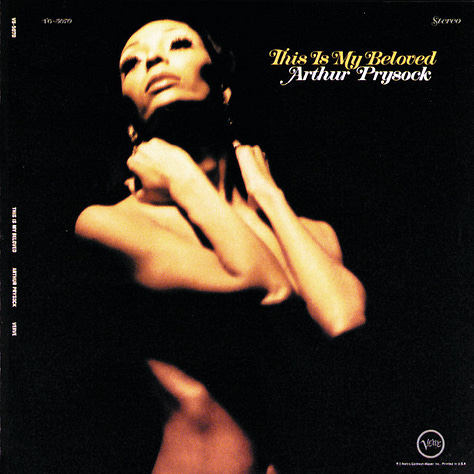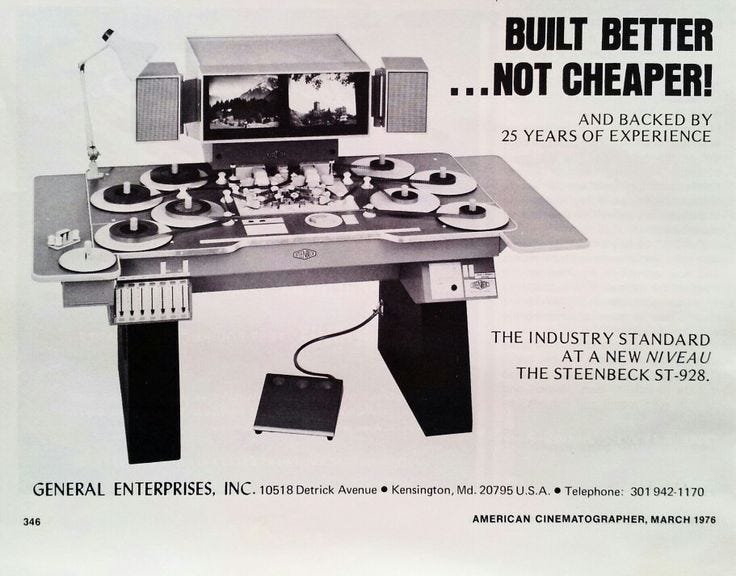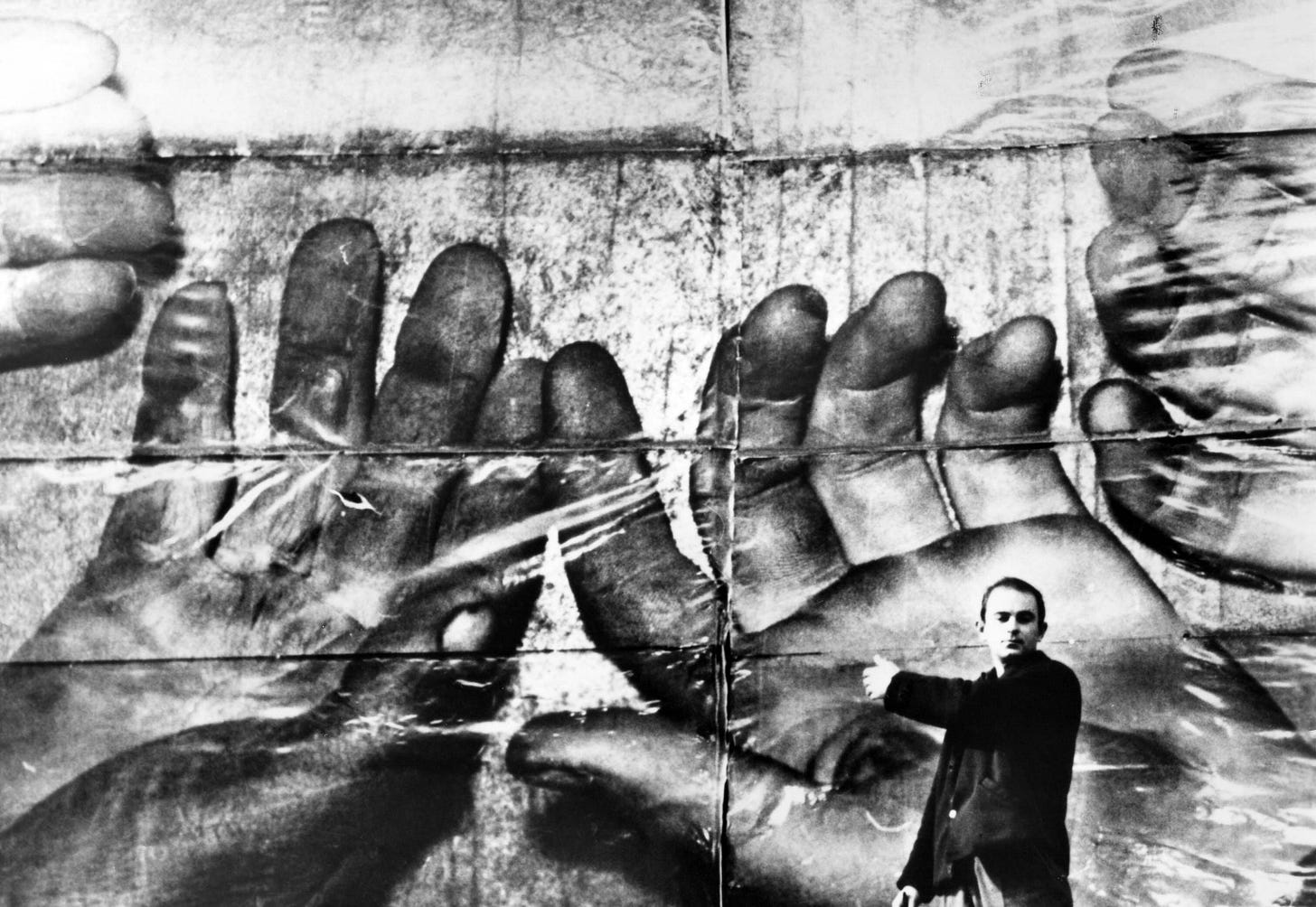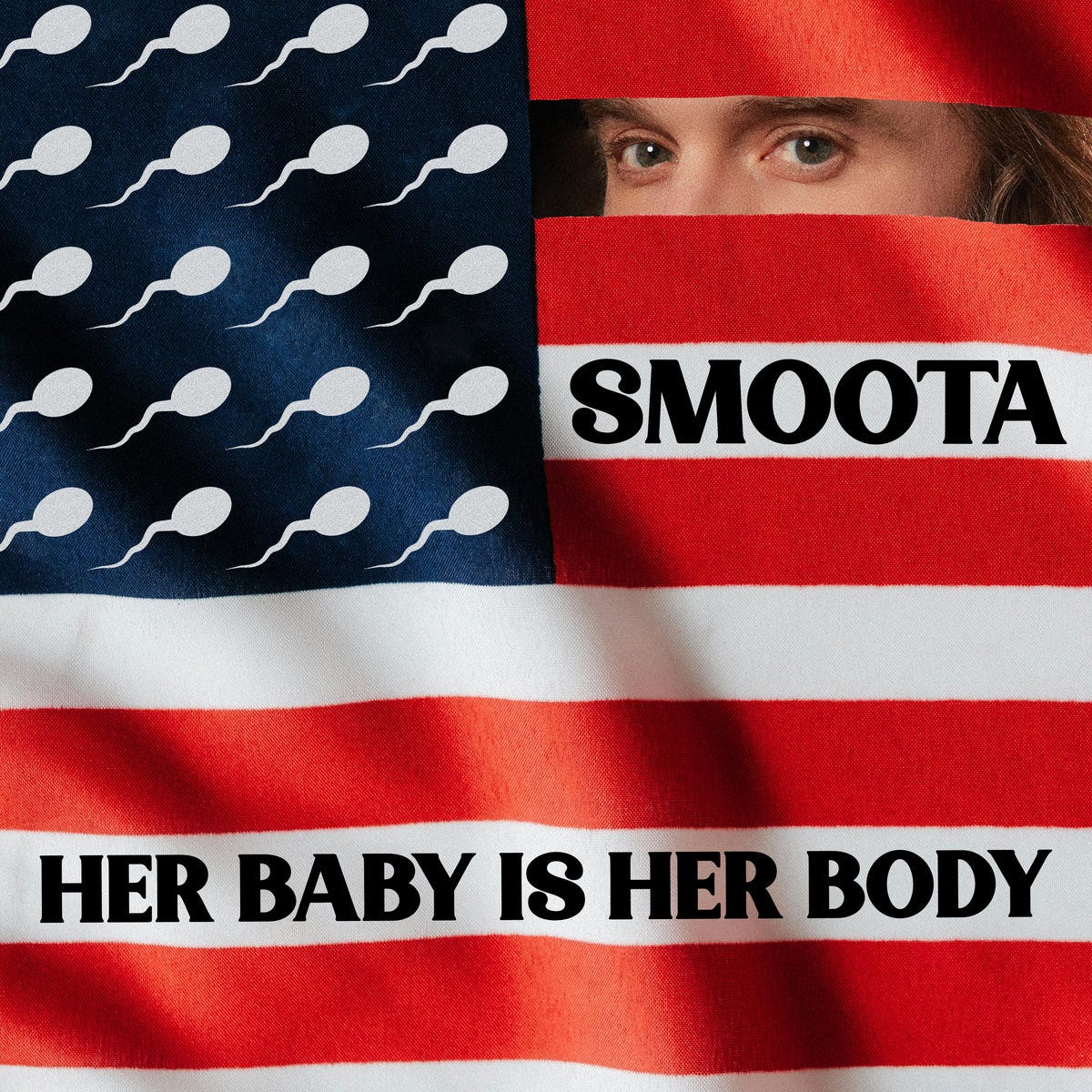Dave "Smoota" Smith's Live Erotic Film Scores
Listen while you watch, with the horniest band in Brooklyn.
I’ve wanted to interview Dave “Smoota” Smith ever since I caught his erotic ensemble, Smootaphilia, at a club on the border of Brooklyn and Queens. The four-piece band performed a sultry live score to Tony Scott’s dusky 1983 directorial debut, The Hunger, starring David Bowie, Catherine Deneuve and Susan Sarandon.
As Bowie transformed from a chic cellist into a grotesque vampire, and Deneuve and Sarandon devoured each other in bed, Smootaphilia surrounded the movie screen, improvising an entirely new score with funky guitar solos, lusty vocal runs, tinkling keys, deep bass and a hard beat.
The rock club crowd watched in awe, gasping, giggling, slightly aroused.
Smith, who tours the world as a professional trombonist (currently gigging with indie icons TV On The Radio), has spent years creating and channeling the essence of Smoota, a flexibly singular persona that reps billowy half-buttoned leopard print shirts, leather boots, luscious locks and a trimmed salt-and-pepper beard.
“Smoota” has actually become a branded term for all of Smith’s personal projects, which include Smoota & The Smoopremes, The Smoota Tête-à-Tête, and, simply, Smoota, a years-long solo project featuring Smith as lead songwriter, musician, producer, music video director, and visionary behind two full-length albums — Fetishes (2013) and Pheromones (2018) — as well as a smattering of politically, culturally and sexually-charged singles.
At first glance, Smith and his work could appear inauthentic, ridiculous, or even creepy. But after a few minutes of investigation, it becomes clear that his approach to art-making embraces a genuine desire to reframe society’s often-flawed approach to eroticism. Smith’s music evokes key ingredients in human sensuality: beauty, love, strangeness, silliness, sweetness, and the taboo.
For two years, Smith’s newest project, Smootaphilia, has fused original music and erotic movie culture for sold-out rooms, inviting audiences to explore groundbreaking sensual art films and the seductive spark of a spontaneous sonic performance.
I spoke with Smith over coffee about his lifelong love of film, funk music, and erotica; as well as the importance of making art based in fun; Smootaphilia’s upcoming record; the problem with sex on the pop charts, and so much more.
I hope you find today’s conversation informative, pleasurable, and long lasting.
Enjoy.
How long have you been a film buff?
I studied film in college with some loose ambitions to go into the industry. I went to Harvard in the 16 millimeter days, so I got to shoot 16 millimeter for free, editing on the old Steenbeck editing bed. I mean, it didn't prepare me at all for the coming film revolution, but it was very cool.
What kind of films were you making back then?
Harvard was very documentary focused. But I was just making weird avant-garde movies starring my dad. I mean, the reason I even mentioned that it was Harvard…
Because you wanted to name drop?
Exactly. I hardly ever do it, but it’s an interesting place to have done film because they didn’t expect you to go to Hollywood, they treated film more as an art form, a study. And I think that’s suited me.
So which filmmakers were you studying back then?
During my senior year they had a guest professor named Dušan Makavejev, who was a crazy renegade filmmaker out of 1960s Yugoslavia. He’s not a household name, but he’s made some cult art films. A terrible teacher when it came to making movies, but he opened my eyes to what making weird art is about.
Very cool.
Also, my thesis advisor was the projectionist at the Harvard film archive. He was a gay guy who introduced me to Russ Meyer and the B-movie aesthetic.
Is that when you became interested in eroticism?
It was more that exploitation movies featured this freedom to explore dark, weird thoughts. No one was in control of what could go into these movies other than the filmmakers themselves. So I learned early on that’s where the truest film art is, when there’s no committee telling you what to do.
Did you enjoy the challenge of hunting down these niche movies?
I did. For me, it’s the same with records and music. It scratched that same itch. Feeling like you’re the only person in the world who knows about this one thing. That was always a feeling I loved, even if it was an illusion.
Were you playing any music at college?
Recreationally. I’ve studied trombone since I was a little kid, but I never thought I was going to do it for a living.
What did you envision yourself doing instead?
Directing.
I mean, you do that now as well, directing your own music videos.
Well I’ve learned that music videos provide a great opportunity to be a filmmaker; you can do whatever you want for next to no money. It’s very freeform. You don’t need to worry about audio, which is one of the hardest parts about making a good movie.
I was watching some of your music videos and was surprised they were allowed on YouTube. I especially loved “Ballbuster” — it was kinky, but surprisingly sweet and tender as well.
The concept of the Smoota project is that there’s a sweetness to eroticism that I don’t think gets portrayed very often.
Do you think there’s a line between “cool” erotic and “creepy” erotic?
It's a fine line that I've struggled with a little bit. If you look at the Smoota project really quickly, maybe you could think I'm a creepy person. But if you spend some time with my music and my videos, or you know me personally, you realize it's not that. Regardless, it’s been part of the challenge of this project.
Has anyone actually gotten the wrong idea?
I had a guy who wanted to manage me years ago and he was asking some of his female friends about what they thought of me. One of them saw my photo on my website and said, “This guy might be a creep.”
Brutal.
It’s also part of the fun of the project, to be honest. Like, how do you ride that line to make somebody have the surprised response you had when watching “Ballbuster.”
I assume “fun” must be a primary ingredient in accomplishing that; I found your albums extremely fun, as well as the whole vibe of Smootaphilia.
Fun is my guiding principle. A friend just gave me a vintage copy of Cahiers du Cinéma, the famous French film magazine from the 60s, and in it they interview Miloš Forman, who made Amadeus and all these cool Czech-language movies. They ask him some high-minded question about his creative process, and he says, “To be honest, I’m always trying to amuse myself.”
That’s refreshing.
I feel like it’s a super deep response. If you’re trying to amuse yourself, chances are other people will be amused, rather than try to educate them or weird them out. It’s such a great form of energy to put into the world, amusement.
I don’t think it’s as easy as it sounds.
It’s not, you have to trust your own taste.
And if you try and mess with your instincts, it will be flawed in some way, contradicting what you’re actually setting out to make.
There are moments when I see old stuff I’ve done and I cringe because I’m a different person now. But you have to avoid thinking about the future when you’re making something. Nothing beats having a good time right in that moment.
How did you create the Smoota persona?
My girlfriend’s a photographer, and we took a trip to Portugal a long time ago where there were these empty nude beaches. She took all of these photos of me just playing around. I had never been a frontman before, or even a singer, but I had the urge to put them on an album cover or something, which started spurring ideas tied to the edgy, weird, often sexual books I’ve always enjoyed.
What books?
At the time I was really into Philip Roth, who writes overtly sexual stuff. What’s interesting is that when you’re that overtly sexual in a book, you can attach it to a specific character, but in a song, people hold it against you because they equate the lyrics with the singer.
Do you think you’ve been able to flip that expectation in your music?
It's still a challenge; I think people still assume everything I sing is what I believe, which it’s not. These are just fantasy realms to explore themes.
You have multiple projects under the name Smoota. Is is a persona?
At this point, there's a blurred line between myself and the persona. Which I’m fine with; I like the response it gets from people, even in real life. It's just made my life a lot more fun, to be honest, and that's the main thing.
How does your persona play into Smootaphilia?
I've always liked sensual movie-music; it’s my go-to music. Whether it's avant-garde jazz or just straight funk music, there's a connection there for me. I feel like all my bands have that aesthetic in one way or another.
Do you think all genres of music have the potential to be sexy?
Probably not, no. Think about twee folk…
Which artists have influenced your music most?
Funkadelic is my number one and probably always will be. I discovered them in high school and I haven’t found another universe that’s as interesting as theirs. Their output is so broad but with a singular aim. It’s fun-focused, and sexy-focused too.
I saw them once in high school and I was stunned by how openly they were talking about sex on stage.
George Clinton is a super deep guy, and he connects sex with politics, race, and with the meaning of America — one sentence of his can contain these multitudes in a way people typically don’t. Like “Free your mind and your ass will follow.” It's a great pithy little line, but it's also super deep: being free and loose with music and your ideas of morality can lead toward personal freedom. In my mind, Funkadelic’s the best expression of freedom in music.
Is there a record of theirs that you love most?
With them, it’s hard for me to choose. Probably Maggot Brain. Rolling Stone put out an issue of the 100 Best Albums Of The 70s and I remember reading the caption and thinking, “That sounds insane. I have to hear that record.”
Has Funkadelic inspired you to create a universe in your own music?
For sure.
The Smootaverse.
I like the multi-levels of everything.
How did you start your Smootaphilia project?
I thought this was going to be a one-off. A friend was throwing a sexy-themed party and he wanted me to do a Smoota show, but I suggested a sexy instrumental performance and we had so much fun. Then, last minute, we introduced the film element.
Does your band share similar music tastes?
The bass player and guitarist and I do; the singer, Ann Courtney, does not. She and I have become very close over the past few years and we have very different tastes. We met in a YMCA swimming pool, and while talking every day for 20 minutes in the pool, I realized that this woman was wild and crazy like me, but in a completely different musical universe. Which totally enhances the band.
What about your other bandmates?
The bass player, Jeremy Kay, is one of the best soul-funk bass players in town. And then Jerome Jordan, the guitar player, who I've known forever, is in the Black rock world. It’s Eddie Hazel and Funkadelic first for him, but also metal and everything in between. So it never becomes cliched funk stuff, he’s incredible.
The project itself is so silly in a way, but the quality of the music is high. It must shock people.
It’s hard to know. I think people have really enjoyed the movie experiences. I don’t know what they even think the music element is.
Can we talk about that? At the Smootaphilia gig I attended — you showed The Hunger — your band’s sound reminded me of what I imagine would play in a 70s porno. But it also gave me chills.
A lot of it stems from electric Miles stuff, but we’re mostly improvising. I’m a big fan of just choosing one chord and playing on it. It’s fun to play complex compositions, but I’m also drawn to simple music where you can’t rely on a chord change to alter the emotion.
I haven’t heard of any other bands improvising a film score.
I’m changing the structure of the score based on the movie, but it’s not like we’re changing the aesthetic of the band at all. We’re not kowtowing to the movie, we’re using it as a launchpad for our own sound.
How do you make sure the music follows the film?
The score I make is just the rhythm track, so I put beats on the movie that are synced up to the scenes. With some AI capabilities I'm able to get rid of all the original music and keep the dialog. Then I write a cue sheet for what we're going to do, mood wise, and the key, and who'll take the lead for each scene. From there, we just follow along. When that downbeat comes in, we're there, and we know what key we're all playing, but we don't know what anyone's going to do.
So you all need to be tapped into the visuals and each other’s output.
That's the fun part. You really have to be listening. Sometimes these scenes are only 30 seconds, so there's not a lot of time to get into something. You have to commit to your approach, and we end up synced more often than not.
It sounds like a metaphor for sex.
It’s about trusting the other person, but also knowing what you want and being committed to what you like and what you believe.
Like some sexual experiences, does it ever not mesh?
With these three people it’s always been great.
Is there a film that you’ve enjoyed playing to most?
We’ve all thought Crash by David Cronenberg was our favorite.
Why?
One interesting thing about this project is that you realize how important the music in a movie is. Crash is from the mid 90s; Howard Shore did the music, and it's a cheesy synth score that's more creepy than sexy. But when you put more overtly sexual music on these creepy scenes, they become sexier. The movie has a lot of long sex scenes where there's no dialog, so we can just get lost in the music on stage. The visuals and actors also embrace a strong aesthetic; it’s a very bizarre world.
Explicitly sexual songs are somewhat normalized on the pop charts. What do you think about sexuality’s place in today’s popular music?
I’m not so into it. I hear a dark cynicism in so much pop music today. A lot of songs will use sex almost as a weapon of misogyny or power. I like to have one more layer of creativity on top of just being about sex.
What kind of layer?
A human layer. Usually, if you’re seducing someone, you’re not aggressively blatant. Instead, you’re beating around the bush a little bit. That’s what’s fun about it.
There’s often some humor in the process, since you’re revealing yourself and your beliefs to someone. Pursuing someone can be utterly embarrassing.
Totally embarrassing. Sometimes the funniest moments in life happen in bed with somebody. That’s what’s so great about it. But in movies you so rarely see a couple laughing in bed. It’s usually very very serious.
Gimme a scene where people are roleplaying and they just can’t fucking do it with a straight face.
Sometimes a comedy will portray sex in funny ways, but I want to see it in dramatic films. Like In The Realm Of The Senses, which we just did for the first time. The actors are actually having sex, but it feels authentic, unlike porn, and there’s a lot of humor in it. At some points during our show, the whole room was laughing.
What do you consider when selecting films for Smootaphilia?
It’s difficult to choose them. They can’t be too plot-heavy because I want the music to be a main focus, and they should be visually compelling, so the audience can get lost in the visuals. Vampyros Lesbos, which we’ve done a bunch of times, is a good example. The plot doesn’t really make sense, but there are so many beautiful scenes we can enhance sonically.
You’re in direct conversation with each other, but also with someone else’s work.
I've never felt more part of a band. We’ve really bonded with this project, and I think it’s partly because we’re not just playing for ourselves; we’re kind of honoring these movies.
Has you perspective on film scores changed since starting Smootaphilia?
It's made me realize how safe most movie scoring is. Music is usually so secondary to the movie. So it's interesting to approach the movie on an equal footing with the music.
Who are some of your favorite film composers?
I don’t listen to that many at home, but I have the music for Ganja & Hess — a Black 70s art horror movie — on vinyl. The music was done by Nina Simone’s brother, Sam Waymon. It’s not traditional movie music.
It’s more daring?
Way more daring. You notice the music. Most film composers would probably say the film is most successful when the music doesn’t take you out of the story. But in Ganja & Hess, the music adds so much intensity.
Soundtracks typically spark my attention more than film scores.
An album I listen to all the time is Trouble Man, which is Marvin Gaye's first-ever soundtrack album. There are so many great exploitation soundtracks, but this one stands out. There’s a looped drum track they use on “‘T’ Plays It Cool” and it’s supposedly the first recording of that ever happening.
Incredible.
There should be more famous musicians doing scores. In a weird way, the big artists who score films now — like the Nine Inch Nails guys or Jonny Greenwood from Radiohead — are doing traditional soundtracks instead of bringing who they are to a film.
Do you have any goals of recording an original score?
I would do it with Smootaphilia. It would be an interesting challenge, but it’s not a real goal of mine because at the end of the day you gotta do what the director says. Right now, we’d rather work on finishing an album.
How has recording an original album changed your approach to the music making experience?
We went into the studio and started by jamming to three movies that we've done live. We have three or four hours of music to pick through, but I have yet to listen back. I have to think about what it will sound like as an album.
What other records are in your sonic pantheon?
After Funkadelic, it’s Little Beaver’s Party Down.
That is the smoothest album of all time.
It really is.
Every time the first track starts I can feel my entire body relax.
In a lot of ways, that’s how I want the sound of Smootaphilia to be. Put it on and suddenly your whole reality is changed. Another big record for me is Newborn Light from this Polish singer Urszula Dudziak. It’s her doing wordless vocals with a keyboard player.
Like Ann’s singing in Smootaphilia?
Yeah, when we think of amazing singers, we usually think of amazing lyric singers. But in Smootaphilia, you just get to hear Ann’s wild, beautiful voice without thinking about the words.
Talk about musical freedom.
Keep your eyes out for upcoming Smootaphilia shows here. Also: some additional records that have inspired Smootaphilia.
